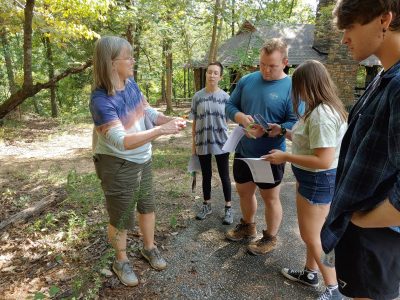by Miriam Wyman
Students who want to be involved in sustainability efforts during their college experience have an outlet with the Academic Sustainability Program, the Office of Sustainability, and various sustainability-related clubs and organizations around campus. A highlight for engagement is the SUST 5000 Senior Capstone course for the sustainability minor where students are involved with semester-long projects with collaborators on campus or in the greater community.

Dr. Nancy Lowenstein working with students in SUST 5000’s capstone course identifying invasive plant species in Chewacla State Park.
Examples of this semester’s projects within the greater community include collaborating with the Lee-Russell Council of Governments on a regional rails-to-trails plan that involves research on socio-economic data, health impact studies (e.g., the benefits of biking trails), and economic feasibility studies for Bullock and Russell counties that advocates can present to their county commissioners to support trail expansions. Another student group is working with ChIPWG (Chewacla Invasive Plant Working Group) on invasive plant removal efforts in Chewacla State Park with mapping the location of invasive plants, publication on invasive plants as a guide for volunteers, and researching and recommending natives species that could be planted once invasive plants are removed.
On campus, the capstone course has collaborated with different departments and facilities. Currently, a project is looking at organizing the re-use of left-over studio supplies within the College of Architecture, Design, and Construction (CADC), the College of Human Sciences (Interior Design Program), and the College of Liberal Arts (Studio Art) to reduce waste and help reduce the cost of new supplies for students. Another project is assessing the current state of grounds management on AU’s campus. This involves researching other college campuses who have addressed pesticide use and alternatives to synthetic inputs, costs, ecological benefits (e.g., soil health and water retention), and other differences between synthetic and alternative pesticide use. Students will develop a plan for testing alternatives in a sample plot for a group to implement next semester. For more on SUST 5000 student projects, please visit: http://acadsustain.auburn.edu/research/student-work/ .
Auburn University integrates interdisciplinary academic programs that focus on the concept of sustainability (the interdependence of ecological systems and social / economic systems). AU’s interdisciplinary minor in sustainability offers a diverse selection of 90+ courses and study abroad programs. In fact, SUST 2000: Introduction to Sustainability class (a core social science course and requirement for the sustainability minor) will be offered in summer 2023 as part of the Auburn Study Abroad Core Curriculum Program in Barcelona, Spain.
There is a culture of collaboration and engagement here at AU and a tradition of engaging both faculty and students who are passionate about sustainability issues; together these promote sustainable initiatives on campus and in the greater community.
Miriam Wyman works as an instructor for the Academic Sustainability Program.
Learn about the SDGs & AU and our contributions related to this post.





